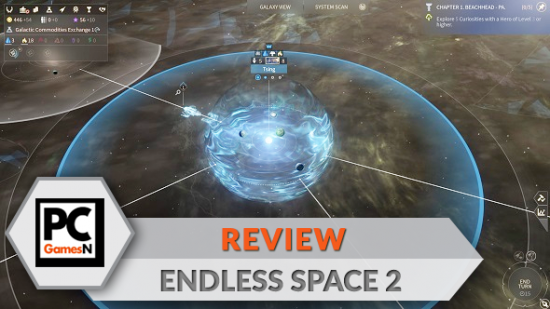The Endless universe of Amplitude Studios’ imagining is a good one, brimming with evocative storytelling, wonderful design of races and creatures, and an adept understanding of the 4X genre. Endless Legend (the Civvy-fantasy one) and Endless Space (the spacey-wacey one) entered their respective fields from virtual obscurity and, thanks to their excellent mechanics and some elegant solutions to longstanding 4X problems, established the Endless universe as one worth exploring (and exploiting, exterminating, etc…).
Here are a shipload more ace space games for the PC.
Endless Space 2 continues much along the same lines, plucking a few ideas from Endless Legend while replacing the canon of the original Endless Space. It’s more streamlined, deceptively accessible, and does a, ahem, stellar job of weaving in narrative when going through those familiar motions of colonisation, resource-gathering and conquest. It does, however, lack the depth of some of its peers, falling into some typical 4X pacing problems while evading others.
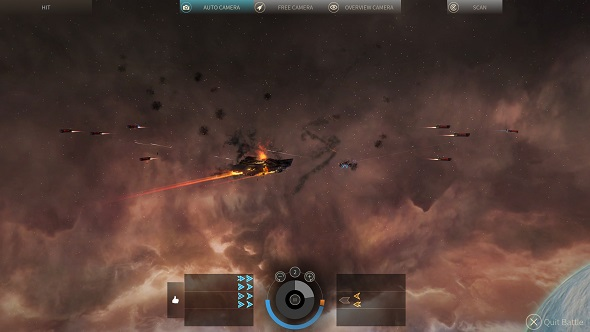
You pick from one of eight factions, each with a distinct style of play that’s come to be a hallmark of Ampitude’s 4X games. One race, for example, are the extra-dimensional Riftborn, who were pulled into the Endless universe from a clean white space of perfect geometric shapes, and instead of using food to reproduce, are manufactured using production. The Vodyani ruined their home planet through over-industrialisation, and travel the universe in massive arks, using them to colonise planets. The savage insectoid Cravers are essentially barbarians, while the United Empire are the humans, with an expansionist, pioneering spirit that’s inspired in equal parts by old Soviet and American propaganda. Every faction forces you to play very differently, and each has interesting mechanics, overcoming what I like to call the Civ Conundrum – where there’s little to tell each nation apart.
As a bonus (and at the risk of revealing a little too much of my own personality), I like how these factions are all rather dickish – falling into such unsavoury categories as gangsters, zealots, brutes and narcissists. Only the Riftborn are fairly sympathetic, and that’s because the poor things aren’t even from this universe. Evidently, it takes a hell of a lot of hubris and authoritarianism to unite an entire species in going spacebound.
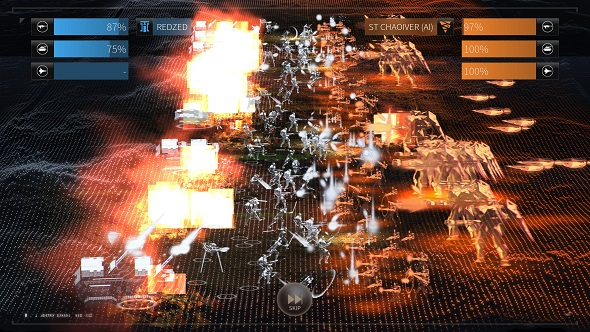
As is the 4X norm, there are several routes to victory – in this case science, wonder, supremacy, conquest, score and economy. You begin with control of a single planet in a single solar system, then travel along constellation lines to uncover new solar systems, factions and spacial anomalies such as nebulas (nebulae?), black holes and collapsing stars, which give you bonuses if they fall under your zone of influence. With the right technological advancements, you can hop over to other constellations for more interstellar exploration, colonise previously inhospitable planets within systems already under your control, and construct various buildings and wonders that will increase your science, influence, production and Dust (currency) outputs. On top of that, there’s a wealth of intriguing events, quests and mysteries out there in the never-ending blackness of the cosmos, all presented with the writing flair we’ve come to expect from Amplitude Studios.
UI and ‘management’ may sound like topics more suited to WebsiteBackendN, but in 4X games they’re crucial, and Endless Space 2 deals with this stuff elegantly where others in the genre can feel rather messy. Luxuries and strategic resources are confined to planets, space travel is mostly along constellation lines, and once you’ve set your ship on a path, you can’t turn back until you reach the orbit of another solar system. You can zoom from a full-galaxy view all the way into the icy rings (and management screen) of your local gas giant within seconds by simply scrolling your mouse up and down, making oversight of the galaxy feel completely seamless. UI is so often the triangular wheel hampering a great 4X experience, but Endless Space 2 nails it. From using a search bar to find certain technologies, to heading to the global marketplace to sell off stocks of resources that have just shot up in value thanks to an actual inflation system, everything you need feels close to hand, which is befitting for a master of the galaxy such as yourself.
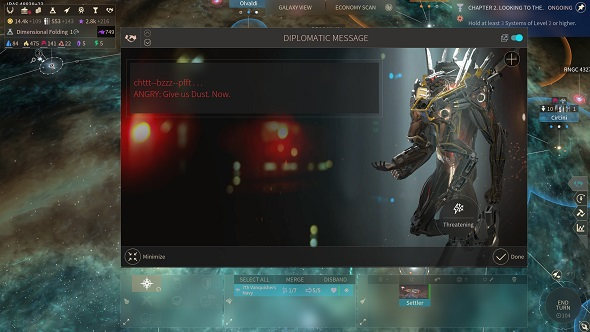
The galaxy map looks lovely – a translucent haze through which you can see distant suns sparkling and disappearing in the background, shooting stars cutting across the endless nothing, and the vague outlines of galaxies where you can imagine similar tales of war and diplomacy are unfolding. The game sounds wonderful too, with each empire having their own theme amid a panoply of twinkly, synthy and at times choral tracks that imbue Endless Space 2 with a distinctly spacey sense of tranquility. These Amplitude chaps sure know how to create a universe that tickles the senses.
Space, being the vast void of nebulous nothingness that it is, can be an awfully impersonal place, so Amplitude have packed it with a fair amount of political scheming, military planning and intrepid questing for you to get embroiled in. You have a Senate that’s shaped by how you go about your galactic business. So if you get involved in a lot of conflict, it’ll lean towards militaristic parties, if you’re doing plenty of research and exploration it’ll be more scientific, and so on. This will have an impact on elections, where you can lend your support to one party or another, which in turn will dictate what kind of laws you can pass. While it’s good to see more detailed political machinations like this implemented, they only feel appropriate for a couple of the races. It’s all well and good for the United Empire to be all sensible and Senatorial, but doing this as the war-mongering Cravers? Wouldn’t they just end up spitting sizzling acid at each other? Or the clone-race of Horatio where everyone is identical, who surely wouldn’t be so divided in their outlooks. It doesn’t quite fit…
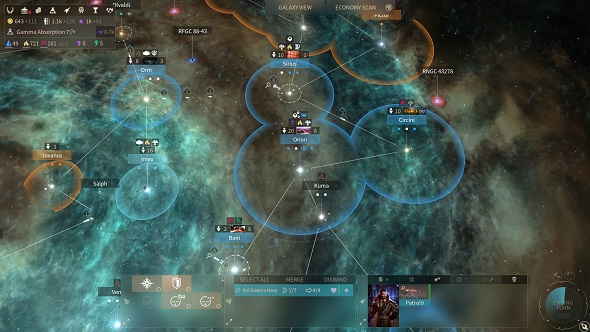
The individual faction quests are compelling. I felt for the Riftborn, for instance, who are appalled by everything in the Endless universe – from stars to flora – because it doesn’t match the perfection of their own abstract universe. And I loved playing as the revered, deity-like Emperor of the United Empire, troubled by rebellions and trying to secure the future of the empire for when he passes away. It’s all wonderfully written, and there are some interesting choices to make along the way (although I’m a little sad that they merely convert to short-term number boosts rather than intriguing narrative developments).
Similarly to my problem with the inexplicably universal Senate system, I was a little thrown that many of the ‘random’ events I’d encountered in my first game seemed to repeat themselves in each subsequent game, with exactly the same written description. Playing as the United Empire (the safe option), it made sense to me when there was an event about the media frenzy surrounding an exploding distant star, because we humans love our media (you can see the tabloid headlines already – ‘A BILLION ILLEGAL ALIENS CROSS OUR BORDER AFTER FLEEING DYING STAR’). But when that same event, with the same description, popped up for the out-of-this-universe Riftborn, it disrupted the fantasy like a black hole would spacetime.
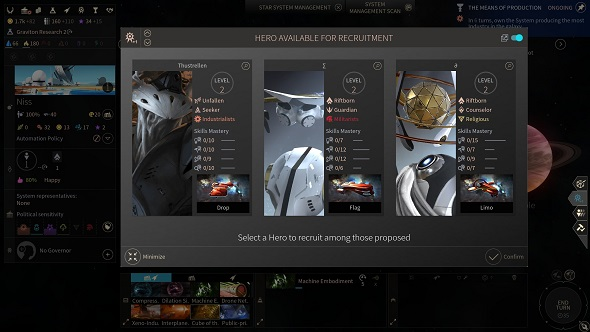
In true colonial style, your empire will grow to be made up of many different peoples and species – even those of your rivals – as you spread across the cosmos. Minor factions, again with intriguing histories and personalities, can be assimilated either by force or by spending influence points to get in their good books before undertaking a quest for them. Once you assimilate them, they become part of your empire, bringing unique traits – such as the Niris who improve food growth on fertile planets, or the samurai-like Hissho who improve your military prowess. These populations inevitably spread through your empire as they reproduce and you send them to systems best-suited to their traits, adding a convincing sense of internationalism (interstellar-ism?) to the galactic landscape. Likewise, you can pick up Heroes – elite, upgradeable units that come from a mysterious trans-cosmic training school known as The Academy – who don’t necessarily have to belong to your species.
While the factions are all intriguing to play as, when they’re your AI opponents they tend to exhibit homogeneous behaviour – i.e. they’re all asinine, aloof bastards who want nothing to do with you unless you bribe them heavily. There’s little in the way of interesting diplomacy options, and for a studio that clearly has some fine writing talent onboard, it’s baffling that these races are reduced to the kind of simplicity I, as a longtime Civ player, have grown desperately tired of.
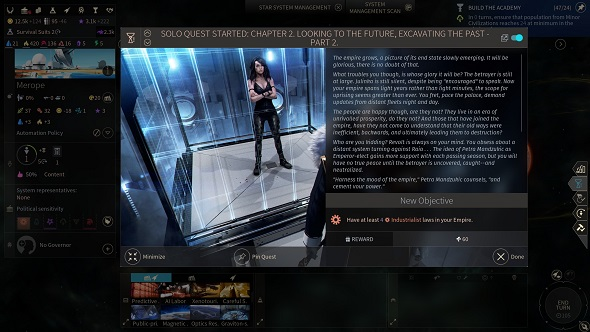
War is a fairly simple affair, restricted to star systems where you engage in space battles and ground-based invasions. Battles are predetermined based on what tactic you deploy from the several available and the fighting capabilities of your ships, which come with plenty of customisation options in the way of guns, defences, manpower and movement speed. There’s definitely some satisfaction to be had in defying the odds of a battle when they’re not in your favour, and there’s some promise in the system where you can direct more than one fleet, telling them whether to attack from a distance, mid-range or close-up. The end result, however, is streamlined rather than tactically complex. Likewise, ground invasions are based on your manpower and a single tactic that you pick before a battle, leaving the rest in God’s hands… or perhaps the hands of those damned titular Endless, who seem to have their tinkering fingers in just about everything in this series. Once you set it all up, you can watch a nice glossy cinematic depicting your battles in real-time (although I watched these all of about three times before getting distracted by more pressing matters).
Despite combat not seeming all that complex, the AI often struggles in getting its head around it. With the exception of a few formidable fleets I’ve had to face, enemies have tended to send ships to attack me in trickles instead of coming at me with any sensible strategy, allowing me to grind XP as they broke on my defences. At one point, I was playing as the United Empire, and the ship-based Vodyani sent some nasty-looking arks my way right after I sent my entire army towards their system. Knowing I wouldn’t be able to make it back for another 10 turns, I thought I was in trouble, only to find that they had almost no manpower with them for a ground invasion, rendering them virtually useless as I steadily built a new fleet to confront them. Twots.
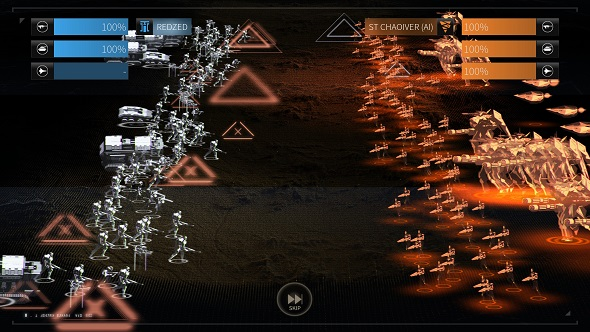
So in the way of dealing with other races and establishing interesting relations (such a crucial aspect of that space colonisation fantasy), Endless Space 2 doesn’t quite reach the stars. But there’s something to be said for a 4X game that actually feels welcoming to newcomers to the traditionally esoteric genre. Systems are in preset locations so you don’t need to freak out over where to build your city. Combat and movement across the galaxy are streamlined, even simplified, and it may well be the best feeling 4X game I’ve ever played thanks to its clear-as-starlight UI.
As is the fate of so much 4X, the pace in Endless Space 2 can fizzle in the mid-late game, and the lack of intriguing diplomacy or in-depth combat means you go through big periods of just raw numbers-building – more money, more production, more manpower. Even the wonderful soundtrack can get tiring when there’s little to distract you from it. The excellent writing and storylines offset this to an extent, but as it stands there are a few hours of humdrum in every game. The beauty of 4X, however, is that these gaps can and probably will be filled by expansions. Which isn’t to say that Endless Space 2 is an incomplete game, but by the nature of the genre it’s one that is designed to evolve.
Just as Endless Legend and Civilization V are now far superior to how they started, so can Endless Space 2 be. It’s odd to talk of foundations in something so markedly floaty and space-based, so perhaps it’s better to think of this as an outpost, plonked down on a planet waiting to be colonised. It’s a fertile planet, sure, but one that’s yet to be fully exploited.
